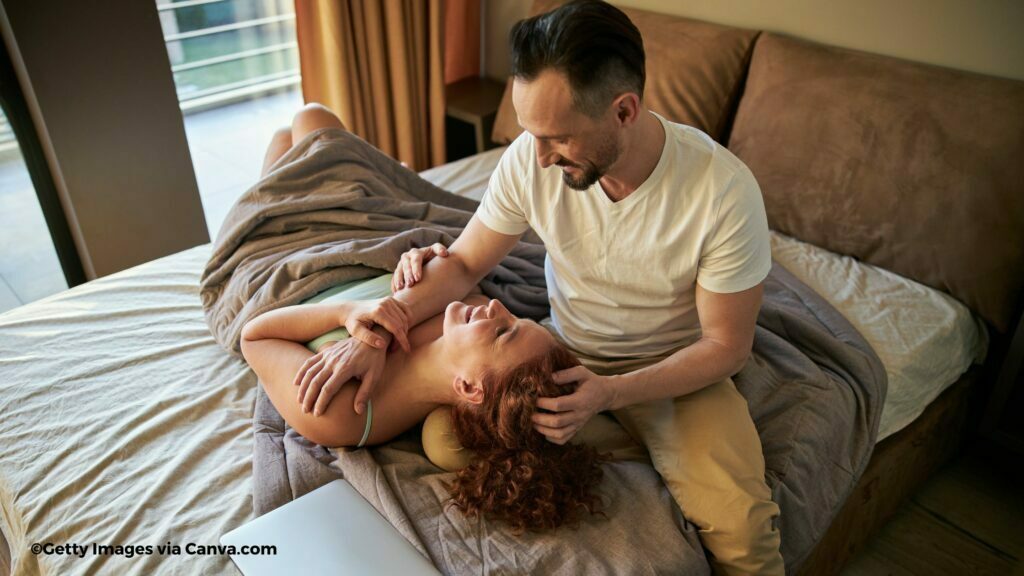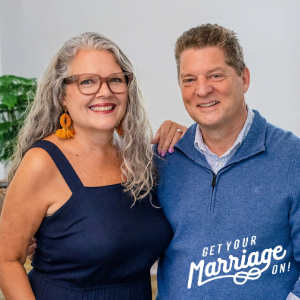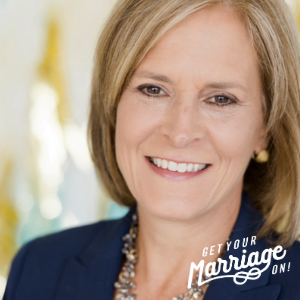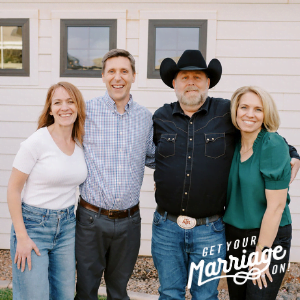There’s a lot of value in asking good questions. First, it opens your mind to other possibilities, and second, it invites you to change. Even if it’s just microscopic, it changes your lifestyle or your attitude about certain things. And third, it puts you in a position where you can receive the instruction, coaching, or guidance for you to really level up things in your relationship.
I emailed my mailing list a few weeks ago, asking for anonymous questions and I got so many good ones! So in this post, I will address several of those questions.
Learning to Love Sex

I’ve been celibate my whole life, and I just got married. I’m finding it difficult to be engaged or look forward to sex. Is that common? I’m worried that I’ve conditioned myself so much to avoid submitting to sexual urges that, even though we can have sex, my body doesn’t know it.
First of all, congratulations on being married recently! And yes, this is absolutely common. I see it all the time. When you’ve conditioned your mind to push sexual thoughts away for so long, you’ve formed a mental habit. It’s time to break that habit!
In a sense, I believe developing your sexuality is akin to developing your spirituality. For example, if you want to grow and become more spiritual person, what would you do? Some examples could include praying more, reading The Bible or other gospel related literature or sermons, listening to music, associating with others that want to grow and develop their spirituality, and so on. Those are kind of things you do to grow spiritually.
Choose activities to actively grow your sexuality
Now, if you want to grow sexually, you would probably go do some of things that help you grow sexually. What kind of music can you listen to? What kind of books can you read? Can you associate with others that have a common goal of growing and developing their sexuality also? And so on. I recommend that you start where you are now and set reasonable goals for yourself to stretch yourself. What does that mean for you?
Would it be reading good books about sex, listening to great podcasts (such as this one), using an app like Intimately Us, or engaging in conversations around sex with your spouse (using prompts from the Intimately Us app or other conversation starters that you can find)? Are there others that you can look up to as mentors that can kind of help guide you through developing your sexuality?
Remember that you’ve been a sexual being from the day you were born. In fact, before you were born, you were a sexual being, and sex really is a form of adult play! So being playful with your sexuality can help you really move that needle a big jump forward into helping your body awaken to it and enjoy sex in your marriage.
Getting Sexual Desire Back

I am a 39 year old woman and I absolutely love to make love to my husband but for the past year It has not been a priority for me because I have just been “not in the mood.” Why have sexual desires dissipated? And how can I get my intense sexual desires back? It makes my husband feel like there is something wrong with him and the way he performs and I don’t want him feeling that way when it is me and not him. Please help.
Fluctuating Sexual Desire is Normal
First, sexual desires fluctuating a little bit in life is completely normal. I would ask yourself, “What has changed in the last year?” Could it be sleep, diet, exercise, friends, difficulties in the relationship, new challenges with children or work, perimenopause? What other things could it be that have changed that might affect sex?
And maybe you’ve relied on your body for sexual arousal, which has been really reliable for you up until this point. But now that you’re aging, it’s going to be a lot more about relying on your mind to generate arousal. And this can be a compound problem. Concern about your husband, having a concern about you can definitely add more layers to the situation.
For example, when you say, “It makes my husband feel like there’s something wrong with him and the way he is performing,” you’re kind of assuming the responsibility to manage his feelings also in this situation. This can really complicate and compound feelings for both of you. So I recommend it’s best to see if you can approach sex with less anxiety about desire in all of this.
Responsive Desire is Normal
Almost all married couples experience, responsive desire. Eventually the longer they’ve been married, one spouse is going to become more responsive or both spouses are more responsive in their desire pattern.
And nothing has gone wrong.
So expect to make some effort to create some space for arousal first, and then desire will increase. Now, responsive desire means something sexy has to be going on first in order for desire to show up rather than the other way around. You’re probably used to having desire and then something sexy shows up. Now you got to put forth some effort to create some sexual context first.
And then desire will show up second.
choose to make intimacy a priority
We can still choose to make intimacy a priority in all of this, whether it’s sexual intimacy or not. You know, sometimes I don’t feel like I’m in the mood to go do my workout in the morning or go on a run, but I do it anyway. And I know that most of the time I feel really good afterwards, and I’m grateful I made that choice. It’s going to be like that in your marriage sometimes.
Another tip that might help you get your sexual desires back is to schedule it. Now that might sound really dumb and perhaps even antithetical to creating desire, but hear me out. What you’re scheduling isn’t sex, per se, but what you’re scheduling is a willingness window. This looks like, “I’m going to set aside time where at least I’m willing to engage sexually and the type of things I like.
Consider what gets you turned on: is it conversation, reading something together, massage, getting out your lingerie, or something else? Choose something that you willing to at least make one step towards, building more arousal and then seeing where things unfold from there. That’s what you schedule. And as you do those things, you might find your sexual desire coming oaring back again.
Higher Desire Wives
There’s a lot of wives that have higher desire in their marriage. And they feel like something’s wrong with her husband or something wrong with themselves because she’s the one pursuing sexually and he’s not as much. And that difference causes a lot of confusion for a lot of women. So I’m going to lump those questions all into this one.

My husband has a low sex drive and I feel like women with higher sex drives aren’t talked about enough. Any tips? Thoughts?
I’d say, absolutely, you’re right. With our current Western culture, we don’t emphasize or normalize women having higher desire or men having lower desire for sure.
And I can see why higher desire wives think something has gone wrong because a lower desire wife (or at least a high desire husband) is what is most commonly portrayed in all kinds of media. And our culture is saturated with messages that men want sex, and men want sex a lot!
About 40% of those I work with are in marriages where the woman has a higher sex drive. So I don’t think anything has gone wrong. We’ve done a few podcasts episodes on this very topic; Episode 27 back in our archives is a great one to start.
His lower desire rarely has anything to do with you
Reasons for your husband’s lower sex desire can range widely. There can be upbringing, genetics, our emasculating culture, being overweight, stress, diabetes, or pre-diabetes, not exercising enough, lack of play in the relationship, self-confidence issues, and so on. There’s so many reasons why men have lower sexual desire. I don’t particularly understand why your husband has lower sexual desire but perhaps you can work with him and see if he’s willing to try out some things to increase his sexual desire, or at least his interest more.
Oftentimes a lot of women I work with take his lower desire so personally; thoughts may include thinking that the reason their husband isn’t sexually interested is because he doesn’t find her attractive or doesn’t love her. But those kinds of thoughts are not helpful in creating a better sexual relationship together. So I highly recommend you work together as a team to see how you can really get to the heart of the matter.
And most often time, the reason why he has lower desire has very little, if anything, to do with you.
Whether you’re the man or the woman, there’s always going to be one in the marriage with more sexual desire. I believe the same general principles apply to higher desire wives as they do to higher desire husbands, with the exception that you’re also fighting against some programming in your brain – that stereotype that men should want sex more, which can feel confusing. So whatever material you can find that helps any individual with higher desire in the marriage, whether the man or the woman, deal with those things in their relationship will be helpful for you. Those principles still apply.
But, sometimes our spouse is lower desire because of how we’re treating them
Now, this is another area where I believe why coaching is so valuable: sometimes our spouse is lower desire because of how we’re treating them. And we don’t even know it.
For example, one of my coaching sessions, I worked with a couple where he had the higher desire and the relationship she had lower desire. And it’s not that she had low desire cause she wasn’t interested in sex, she just wasn’t interested in that type of sex that we’re having. Meaning, the way he treated her around sex always had to be the kind of sex that he wanted, not the kind of sex she wanted. It had to be done on his time schedule and the way he wanted and demanded that she kind of fold into that. And when she wasn’t, he’d get frustrated and then call her out because he’s the higher desire and she’s a lower desire.
But once he learned to really back off and, frankly, calm the heck down, and chill out a bit and humble himself a bit, they worked harder at making enough room for two people in that relationship, letting her desires prevail once in awhile, doing sex her way. Once that happened, her sexual desire shot right up through the roof. Now they’re both equally enjoy sex. So I do see situations where our spouse is lower desire precisely because of the way we’re treating them. and that can be something that can be exposed and help you work through in a coaching session.
Being Open to Your Spouse About Your Desires

I have a promiscuous past, and it holds me back in the bedroom – afraid that he’ll think less of me, or wonder where I’d done that before. It’s also hard as my past created a desire for a bit of aggression – firmness – in the approach to foreplay and he’s so polite and gentle that I have a hard time getting fired up. Open to any suggestions about how to overcome these hurdles.
There are two parts to this question: dealing with feelings of a promiscuous past and wanting a more erotic experience with your husband.
don’t let your past cause you to live in fear in the present
Every time you find yourself holding back because of thoughts about your past, you have a few choices to make: to stay in the comfort zone of letting your past define who you are, or to let the past stay in the past and courageously step into your full present self. This principle applies not just to one with an experienced sexual past, but anyone struggling with body image issues, divorced or widowed and remarried, etc.
I also wonder if you’re giving your perception of your husband’s judgment too much power. When you let your fear of what your husband might think of you run the show, you’re limiting your sexual self. If I was so afraid of what others might think of me as I open my mouth to record this podcast episode, I might never create this content. It’s a skill to realize there is genuine concern of judgment of others but to move forward anyway, despite that feeling being there. Chances are the more you step out of your comfort zone into your true nature sexually, the more freedom and joy you’ll find. This takes discernment and courage of course, and sometimes baby steps are needed.
Each person’s sexuality is unique
The reality is that we all have proclivities or erotic maps as someone else has said. There are things we are naturally drawn to sexually. What you are drawn to is unique to you, just as your personality and fingerprints are unique to you.
You say that your past created a desire for more aggression and firmness in foreplay, but I want to offer to you another way to think about it: your enjoyment of aggression and firmness in sex was there before your promiscuous past. Your promiscuous past didn’t make you enjoy it, but just was the way you discovered what you’ve always found appealing. You could have not have had a promiscuous past and still discover that you like this form of play in your relationship.
And another thing for you to think about is perhaps because of your fear of your past, you were motivated to marry someone that’s very opposite. Someone very gentle and docile and polite. And now that you’ve been married for a while, you’re running into situations where you wish your husband was a little bit more aggressive and firm in the foreplay.
Now, let’s address the second part of the question.
Express your desire and invite your spouse along
I heard a story about a woman. She’s an attorney. She’s not only an attorney, but she leads her law firm. So she’s the boss. She tells other people what to do. In other words, it’s a job involving a traditional masculine energy all day long with a lot of stress and pressure. And then when she comes home, she does not want to be the boss in the bedroom. She wants her husband to lead the encounter. The thing is, she married a very gentle and kind and polite and docile man.
Things haven’t been going great in the bedroom because she’s sick and tired of bossing people around all day which leaves no desire to boss her husband around in the bedroom. So she asked him, “Will you please tie me up? I really want you to tie me to the bedpost and just have your way with me.” And her husband was flabbergasted. In his mind, he thought that was mean and didn’t want to. But she explained like, look, I just really want to be taken. I want you to just be kind of aggressive with me. Now, this man’s a really good man and he extended himself. This was hard for him to do, but he did it. And, you know, he had a few blunders along the way, but he kind of got into it and tied her up and had his way with her. And she absolutely loved it! She loved him taking the lead and it kind of opened up a new chapter, a new, way that they can enjoy that sexual play together a whole lot more.
So I do recommend you open up to your husband tell him what you like. Ask him if he would please be willing to extend himself a bit. This may be kind of counter to his nature right now, but if he is willing to open up to try this, you might be surprised it might actually be the ticket to helping you get the sexual relationship you both really crave.
When a Spouse Resists Working on the Marriage

I feel like our marriage is changing in negative ways as we enter the middle years of teenagers and young adult children. My husband feels like all is well as long as we have sex. He is somewhat resistant to taking the time to work on something he doesn’t feel is broken. Any ideas for encouraging him to do something like marriage coaching or counseling with me?
I get it. I wonder if he feels like the marriage “isn’t broken,” so why fix it, especially if we’re having good sex?. Why would a husband want to “waste time” on something that he doesn’t think is a problem for him? I’ve heard some husbands express, “why would I want to go to counseling when they will just bring up all the bad stuff from the past?” He may feel like it will just bring more conflict/contention.
Don’t make your spouse a project
My guess is he’s resistant to marriage coaching because he’s afraid it’s all about fixing him, as if he’s now a project. I’m not discounting his unwillingness to address things in the relationship he’s ignoring or masking (through sex perhaps). But sometimes we see the flaws in our spouse so much more clearly than we see our own shortcomings and blindspots. I think this is what Jesus was teaching when he talked about the plank and spec (or beam and mote).
If the roles were reversed and the husband was like, “Hey, we should go to a gym and get a trainer and a nutritionist so “we” can get more healthy and in shape,” but what he’s really saying is that you’re out of shape. What if she didn’t feel like there was a sufficient problem about being in shape or not, but she feels some subtle pressure like maybe she’s not good enough for him? She might resist doing what he suggested to assert her independence and autonomy, just for the sake of it, regardless if she needs more exercise. We often find it easier, in the short term, to justify not working on ourselves for fear that maybe those insecurities our spouse is bringing up are true. She might feel like the project in that scenario.
When you make a change, it affects the marriage system
There’s a popular theory among marriage coaches that intimate relationships are a system. Think: like an algebra equation. When one person in the relationship starts doing things differently, it affects the system – the other side of the equation. I’ve seen in my own experience in my marriage, as well as the couples I coach, where once one person starts to pull the plank out of his or her eye and address some of his or her own blind spots, in other words, really steps up in the relationship, a byproduct of that is it puts positive pressure on the other person in the relationship. There’s no guarantee that the other person will step up as a result. They may not, and the relationship may not last.
My advice would be to get some coaching for yourself first. Eventually your husband might come on board and then sign up for Next Level. That’s my program. 🙂
Sexual Imagery

Of course physical toys are exciting and, as I understand it, can be a critical tool to get to the level of excitement desired for mind blowing sex. What about “mental toys”? What place does erotica (if at all) play in mental sexual excitement? I know personally that my physical sexual response is greatly heightened when it is preceded by seeing something stimulating. How does this get balanced with personal values?
It seems that I am only aroused by watching romance scenes in TV shows/movies. I’ve realized that even though I don’t watch graphic sex scenes, I’m exposing myself to a form of porn. I’ve become convinced to stop watching these movies and TV shows, but now I’m having trouble getting turned on in other ways… even by my own husband… I’ve had maybe 3 orgasms in our 5 years of marriage. I feel defeated. What do I do?
These are excellent, honest questions. I’m a big believer in living by principles rather than following an arbitrary list of dos and don’ts. Let’s talk about a few principles that might help you.
You make your own decisions about your sexuality
The first is that what you decide to do or not do sexually is a choice between you and your spouse, based on the values you hold., not on what an outside person tells you to do.
Another principle is that God does not command in all things, especially when it comes to sex. From my understanding of the Bible, God is very clear that full sexual expression is between a man and woman lawfully married. Within that context, there’s quite a large playground and there’s a lot of flexibility for individuals and couples to explore and define what kind of sex life they want to build. In short, I believe God trusts us enough to give us a canvas to explore and find goodness in our sexual relationships. This is also why doing particular sexual behavior X works for one couple but doesn’t work for another couple. There’s no one-size-fits-all how to have sex or how to build arousal. It’s going to be extremely dependent on the couple, their tastes, preferences, upbringing, world view, personality, proclivities, and so on.
Opportunities to make choices and use agency is integral to our maturing and growing. It’s an important piece of the “people growing machine” of marriage.
Do your choices bring goodness to your spouse and the marriage?
Speaking of goodness, another principle is what Jesus taught in the sermon on the mount and in the sermon on the plain: you shall know them by their fruits. You know a tree is good because its fruit is good, just as you know a tree is bad because its fruit is bad. So whatever it is that you’re engaging in sexually, look to the fruit: did it draw us closer together? Are we more excited about being together sexually? How is our marriage bond strengthened because we participated in X, Y, or Z?
Another principle is that psychological arousal is a key component to great sex. Sexual imagery (whether in visual or written form) helps individuals generate arousal and sexual desire. I know of many couples that use sexual imagery, stories, etc. to help them get aroused and then they have extremely meaningful and rewarding sexual experiences together. This is the fruit they’re after: deep connection, excitement and arousal for a better sexual experience, which is their ultimate goal. Of course there’s discernment here, and adhering to the other principles discussed above.
I had a guest on my podcast, Ashley, that shared her story about how she finally learned how to orgasm after struggling for many years. Her key was more psychological arousal. You can listen to her experience and how it helped her, it’s episode #121, “How I Learned To Orgasm: A Sextimony with Ashley”
One more principle is that if you are engaging in behavior that you feel violates your values, chances are you’re not going to enjoy it. For example, if you really don’t like the idea of filming yourselves having sex with your spouse (that goes against your values), and you do it anyway even after addressing security and privacy concerns of the video you make, chances are you’re not going to be happy with the outcome. So get clear on what your values are and live in integrity to your values – that will help you enjoy sex.
It’s good for us to stretch ourselves a little
That principle needs to be balanced with the idea of stretching ourselves sexually. You’d tell your kids to try new foods, sports, books, classes, friends because you know it’s good for them to stretch outside of their comfort zone from time to time. The same goes for our sexuality. It’s good for us to stretch a bit and try new things, including things that might arouse you psychologically.
I’ve personally found as I age, and the couples I coach that are older than me, can’t rely on their body to create that physical arousal for them all the time. In other words, sex becomes a whole lot more mental than physical. And that’s not a handicap. You can have incredible mind-blowing sex because you’re engaging your mind – your most powerful sex organ.
I realize I might get some pushback on this answer. People might use what I just said as ammunition to justify pornography use or open door romance novels or whatever it is they want to justify in their marriage. I’m not advocating pornography use, or any non-concordant sexual behavior. Building a great marriage is about being sexual partners that cooperate, not compete against each other, to create outcomes they’re both happy with. This will likely include one or both spouses pushing each other to grow in new ways.




